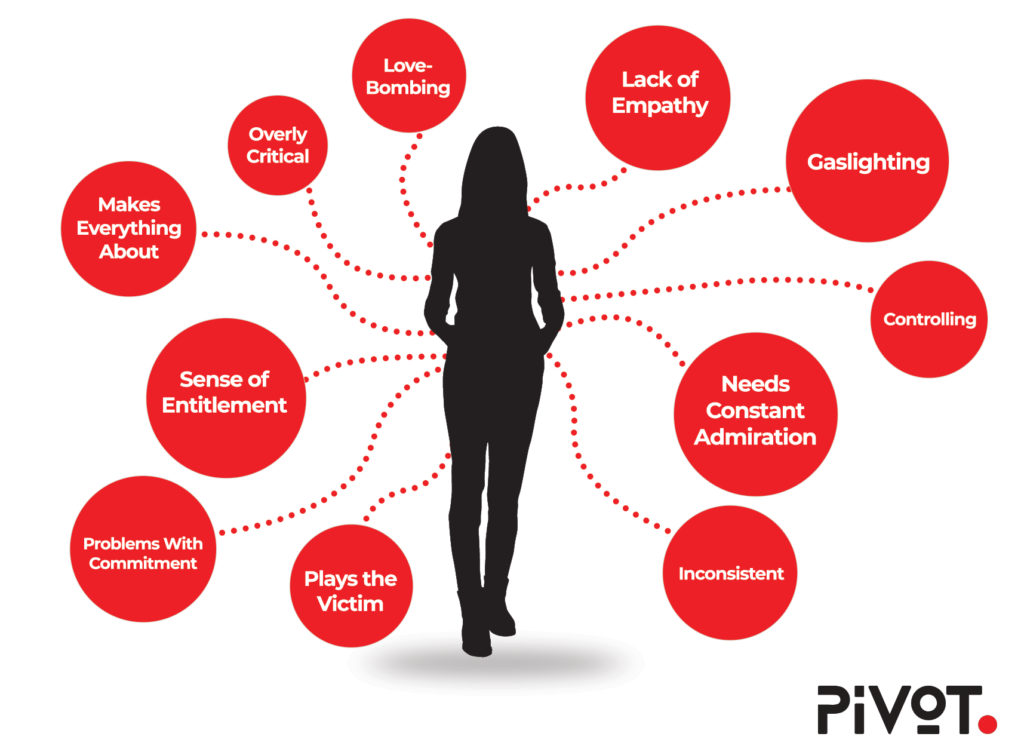The label “narcissism” is thrown around a lot nowadays, so much so that it’s almost become trendy. The truth is, spotting a truly narcissistic partner requires more than just noticing a bit of arrogance or self-absorption. Narcissistic behavior goes deeper: it’s manipulative, damaging, and often leaves you questioning your own worth. If you recognize the signs of a narcissistic partner, reach out to the expert relationship coaches at PIVOT. We offer tools and insights to understand and unpack unhealthy relationship dynamics, heal codependency, and work through narcissistic abuse.
Identifying Signs of a Narcissistic Partner

Through specialized relationship coaching, immersive retreats, and educational resources, PIVOT empowers individuals to identify behaviors like manipulation, gaslighting, and emotional inconsistency that are characteristic of narcissistic partners. By learning how to set boundaries, build self-awareness, and prioritize emotional well-being, PIVOT can help you gain the clarity and confidence to take control of your relationships and protect your mental health.
If you feel like you might be in a relationship with a narcissistic partner, here are some questions to ask yourself.
Signs of a Narcissistic Partner: Questions to Consider |
|
|
Love-Bombing |
|
|
Lack of Empathy |
|
|
Gaslighting |
|
|
Needs Constant Admiration |
|
|
Controlling Behaviors |
|
|
They Play the Victim |
|
|
Inconsistent |
|
|
Sense of Entitlement |
|
|
Problems With Commitment |
|
Answering these questions may have stirred up some big feelings. It can be devastating to recognize that you may be involved with a narcissist, but in a way, it is also freeing. You’ve identified part of the problem, now you just need to take the first hard steps towards the solution.
Working with a dedicated relationship coach can help you work through the challenges of being with a narcissistic partner. At PIVOT, our coaches work with couples both individually and together to unpack past traumas, explore healthier communication patterns, and come up with an actionable plan to move forward. Whether you work with us individually or with your partner, you’ll have a compassionate coach advocating for you every step of the way as you work towards a happier future.
And, if you aren’t sure whether you are properly identifying the signs of a narcissistic partner, our relationship coaches can help with that too. Sometimes, what may seem like narcissism is actually something else.

When Narcissistic Behaviors Aren’t Actually Narcissism
For some people, behaviors that seem like narcissism are actually deep-seated core reactions to unresolved trauma. Trauma can cause people to act defensively, seek excessive validation, or struggle with empathy–not because they’re self-absorbed, but because they are protecting themselves from past wounds. These behaviors may mimic narcissism but are actually rooted in fear, insecurity, or emotional pain. PIVOT coaching can help you recognize this distinction so you can respond to your partner compassionately, with healing and understanding instead of blame.
When the Signs of a Narcissistic Partner Actually Mean Something Else |
|
|
Love-Bombing |
Over-the-top affection at the beginning of a relationship might not be manipulation but just genuine excitement! Your partner might be really into you and trying to show it in every way they know how. If the intensity cools down naturally over time, it might just be the honeymoon phase fading rather than a narcissistic game of love bombing |
|
Makes Everything About Themself |
Your partner might seem self-absorbed because they’re mirroring your stress. If you’ve been so caught up in your day-to-day that they feel overlooked, they could just be desperate to be heard. It’s not healthy, but it’s more about needing connection in a moment of frustration than being a narcissist. |
|
Lack of Empathy |
What looks like a lack of empathy can actually be emotional burnout. If your partner has been trying to support you but is also struggling with their own baggage, they might retreat emotionally; not because they don’t care about you, but because they’re running on empty. |
|
Overly Critical |
Criticism can sometimes come from a place of fear: fear of losing you, of not being good enough themselves, or of their own insecurities. Maybe your partner’s not a narcissist but instead reacting to a sense of inadequacy or a rough patch in the relationship. |
|
Gaslighting |
Gaslighting behavior occasionally stems from fear of confrontation or unhealthy conflict avoidance. Your partner may twist things in the heat of the moment to avoid looking like the bad guy or to protect themselves from emotional fallout. While still toxic, it’s not necessarily a sign of narcissism but of deeper relationship issues, like poor communication or unresolved trauma. |
|
Needs Constant Admiration |
If your partner is feeling insecure, especially during a challenging period in their life, their need for validation might increase. It’s less about a personality disorder and more about looking for comfort from you. |
|
Controlling Behaviors |
In some cases, needing control comes from anxiety rather than a desire to dominate. If your partner has been hurt in the past or fears abandonment, their controlling behavior might be a misguided attempt to keep the relationship stable. It’s still unhealthy and definitely needs to be addressed, but it’s rooted in fear, not narcissism. |
PIVOT can help you change your behavior if you’re unintentionally triggering your partner into these narcissistic-like negative reactions. With our intensive relationship retreats and coaching sessions, PIVOT helps you identify your own emotional patterns, actions, and personal triggers that may be contributing to this unhealthy relationship dynamic. By teaching you how to respond calmly, set boundaries, and express your needs in a constructive way, PIVOT guides you in shifting the way you interact with your partner. This not only helps reduce conflict but also pivots you to a healthier, more supportive relationship where both partners can thrive.
Transform Your Relationship With PIVOT
If you recognize signs of a narcissistic partner in your relationship, reach out to begin the journey to a healthier, happier life. We can work with you individually or together with your partner to reach relational freedom. You can reach us at 1-855-452-0707.